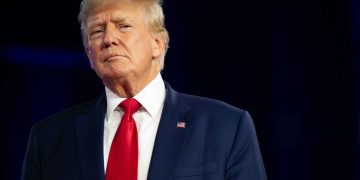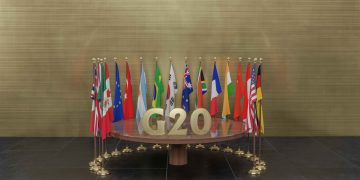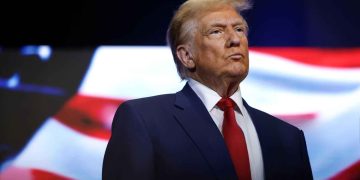Nigerian President Bola Tinubu and South African President Cyril Ramaphosa held key discussions on the sidelines of the U.N. General Assembly in New York, focusing on deepening economic cooperation between the two largest economies in Africa. The meeting, aimed at fostering collaboration in critical sectors like mining and telecommunications, aligns with the broader goals of the African Continental Free Trade Agreement (AfCFTA), which seeks to boost intra-African trade and economic development.
The bilateral talks are part of President Tinubu’s broader strategy to attract foreign investment and accelerate Nigeria’s economic growth. With Africa facing mounting challenges, from poverty to underdevelopment, deeper economic cooperation between regional powerhouses such as Nigeria and South Africa could set the stage for significant progress across the continent.
Economic Focus: Mining and Telecommunications
During their meeting, Tinubu and Ramaphosa specifically explored ways to ease restrictive business policies that currently deter foreign investment, particularly in the mining and telecom sectors. Both leaders recognize the untapped potential of these industries and the benefits of improving business environments to attract more international capital.
Nigeria and South Africa, with their vast natural resources and growing digital economies, are well-positioned to leverage their cooperation to unlock mutual economic benefits. Tinubu stressed that enhancing economic ties would create jobs, stimulate industries, and ultimately lead to stronger economic outcomes for both nations. “Improved economic ties will be a win-win situation for both countries, generating employment and fostering long-term economic stability,” Tinubu stated.
Isaac Botti, a Nigerian economist, echoed this sentiment, noting that a strengthened alliance with South Africa would significantly impact Nigeria’s economic diversification efforts. “South Africa is the second-largest economy in Africa, and partnering with them will enhance our economic growth. Collaborations in mining will help Nigeria diversify its economy, which is still heavily reliant on oil,” Botti explained.
Broader Continental Impact and AfCFTA
Beyond their national interests, the cooperation between Nigeria and South Africa is expected to contribute to broader African economic goals, particularly under the African Continental Free Trade Agreement (AfCFTA). Experts argue that if the two economies can align their efforts, it will set a positive precedent for other African nations and drive overall economic growth across the continent.
Rotimi Olawale, a political affairs analyst, emphasized the importance of African countries working together, especially in times of global uncertainty. He noted that deeper cooperation between Nigeria and South Africa could address pressing issues like poverty and low living standards on the continent. “It’s high time African nations, especially the big players like Nigeria and South Africa, collaborate more effectively. During the COVID-19 pandemic, other regions like the EU worked as a bloc, and Africa should follow suit to negotiate better opportunities for its citizens,” Olawale said.
Tinubu’s Economic Reforms and Global Outreach
Since taking office in May 2023, President Tinubu has introduced some of the boldest economic reforms Nigeria has seen in decades. His administration has scrapped the popular but unsustainable fuel subsidy, a decision aimed at redirecting funds toward more productive sectors of the economy. These reforms, combined with efforts to improve business conditions, are designed to make Nigeria more attractive to foreign investors.
The meeting with Ramaphosa marked the beginning of a series of high-level engagements for Tinubu at the 78th U.N. General Assembly. Tinubu’s agenda for the week includes discussions with U.S. President Joe Biden and top executives from global companies such as Microsoft, Meta, and ExxonMobil. These meetings are aimed at forging strategic partnerships that will bring in investments to bolster Nigeria’s technology, energy, and telecom sectors.
Olawale said these engagements are critical to Nigeria’s economic future. “Nigeria is in dire need of foreign investments, particularly in sectors like technology, telecoms, and construction. Tinubu’s meetings with global leaders and corporate executives are essential for attracting the kind of capital that can drive growth in these sectors,” Olawale added.
South Africa’s Role and Prospects
South Africa, under President Ramaphosa’s leadership, is also focused on reinvigorating its economy, which has faced challenges in recent years due to political instability and slow growth. Ramaphosa’s government sees cooperation with Nigeria as a key component of its broader strategy to enhance regional trade and development. By collaborating on initiatives like mining and telecommunications, South Africa hopes to tap into Nigeria’s growing markets while offering its own expertise in these sectors.
Experts believe that Ramaphosa’s focus on easing business regulations and improving investment conditions will play a crucial role in advancing both countries’ economies. For instance, South Africa’s mining industry is among the most advanced in Africa, and its expertise could significantly benefit Nigeria, which is still looking to maximize its mining potential.
Tinubu’s UAE Breakthrough and Future Diplomatic Success
President Tinubu’s recent diplomatic efforts have already yielded significant results. His visit to the United Arab Emirates last week resulted in the lifting of a visa ban on Nigerian travelers. Additionally, the UAE government committed to investing billions of dollars in various Nigerian sectors, including agriculture and defense. These developments demonstrate Tinubu’s proactive approach to securing international partnerships and investments for Nigeria’s economic development.
The Tinubu administration’s focus on fostering international relationships continues to be a central theme in its economic strategy. The meetings in New York are part of a broader diplomatic push to attract foreign investments and position Nigeria as a leading economic player in Africa.
A New Era of Economic Cooperation
The discussions between Nigeria and South Africa signal the beginning of a new era of economic cooperation that could have far-reaching implications for Africa. By working together to ease business regulations, improve investment conditions, and tap into each other’s strengths, both nations stand to benefit significantly. Moreover, this collaboration aligns with the goals of AfCFTA, potentially leading to broader economic growth across the continent.
As Tinubu continues his global outreach efforts, Nigeria is well-positioned to attract the investments needed to diversify its economy and drive development, while South Africa’s role as a key partner highlights the importance of regional cooperation in achieving sustainable growth.





















